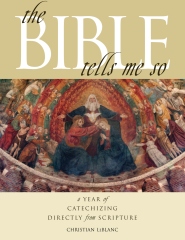Here are some recent stories about young men who’ve saved people from being kidnapped:
- Teen Named a Hero after Saving Woman from Kidnapping
- Hero Teens Save 5-Year-Old by Chasing Kidnapper on their Bikes
The way these young men acted was heroic. We don’t need to know what their grades are, or what kind of job they have, or whether they remember to put the trash out every week without being reminded. We can be certain that whatever else is going on in their lives, perhaps saintly or perhaps woefully average, this one thing these young men did was genuinely heroic.
We can admire this valor without therefore saying, “There should be more kidnappings, so that young men have more opportunities to show their heroism.” That would be nonsense.
Heroic actions are by definition a fight against the fall. Whether it is clinging to grace as Mary did, and as the unfallen angels did, or whether it is the everyday battle we all must do against ourselves as our own worst enemies, the whole nature of heroism is that we’re drawing a line between good and evil, and scrambling to hold the line for good.
Michael Novak writes about why women who favor abortion hate pro-lifers, reporting on Paul Swope’s essay, “Abortion: A Failure to Communicate,” the April 1998 issue of First Things. Novak writes:
To such women, having an unplanned child “represents a threat so great to modern women that it is perceived as the equivalent to a ‘death of self.’” This reaction may be emotional and subconscious, but it generates a feeling that one’s life is over.
Swope explains that this is because many young women have developed an intensely narrow vision of their own identity: “going through college, getting a degree, obtaining a good job, even getting married someday.” The sudden intrusion of motherhood afflicts them as “a complete loss of control over their present and future selves. It shatters the sense of who they are and will become, and thereby paralyzes their ability to think.”
At this point, such deeply troubled young women are not likely to perceive a sharp-edged choice of either “I must endure an embarrassing pregnancy” or “I must destroy the life of an innocent child.”
“Instead,” Swope writes, “their perception of their choice is ‘my life is over’ or ‘the life of this new child is over.’ Given this perspective, the choice of abortion becomes one of self-preservation.” Thus it is not so hard to see that, to a young woman facing an unplanned pregnancy, abortion can seem like the most morally defensible option.
These women do not know how badly they have been deceived.
I have had the privilege of knowing a number of women in crisis pregnancies who rejected the often forceful pressure on them to abort. These are heroic women.
I do not say, and neither would they, that there’s any nobility in getting pregnant outside of marriage. Not at all.
But welcoming and nurturing new life is the thing we women do. It is in every case heroic, just as defending and protecting and providing for that life is the heroic thing that men do. (And of course there’s crossover — these are broad strokes I write with.) When a woman in crisis chooses to resist evil and stand for good, she does a heroic thing.
What happens is something unspeakably beautiful. That beautiful thing is a new human being, irreplaceable, unlike any that has ever been or ever will be. You can hold that baby in your arms, his head pressed against your against chest, and you will wonder how anyone could ever ask you to let him go. You will know that no matter what happens, you have done the right thing.
Eighteen years later, that baby will hold you in his arms, your head pressed against his chest, and you will wonder how anyone could ever ask you to let him go. But you will know that no matter what happens, you have done the right thing.
Heroism isn’t easy. By definition it is scary and hard and tiring and sometimes even mind-numbingly boring.
But a crisis pregnancy is not a condemnation. It is an invitation.
It is an invitation to take what may have been one of the worst things that ever happened to you, or the most selfish thing you ever did, and turn it into the most beautiful, courageous, intimate, sacrificial and flourishing rest of your life.

Artwork: Luca Signorelli. Virgin and Child with Sts. Michael, Vincent of Saragozza, Margaret of Cortona and Mark. c. 1510-12, via Wikimedia Commons. St. Margaret is the patron of single mothers, and for good reason.
Related: Rachel’s Vinyard offers confidential, non-judgmental healing retreats for women and men who’ve been involved with abortion.






















